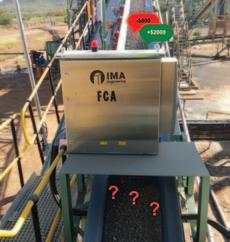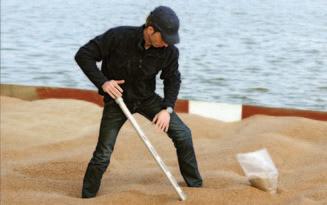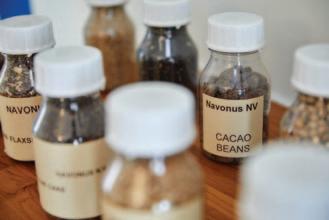
3 minute read
IMA Fast Conveyor Analyzer, a solution for copper mining risks
IMA technology allows mines to know where the valuable ore is. This information is key to avoiding processing waste, which involves a huge quantity of water.
The recently published PricewaterhouseCoopers LLP report warns about the risk of having more than 50% of the copper mines in drought areas by 2050.
So, reducing water and power use is essential during all mining stages. This is because the quantity of necessary copper for the clean-energy transition is increasing drastically.
Technology Is The Key
IMA Engineering’s technology works in this direction, from drill cuttings, blast hole sampling, and analysis on-site, to online elemental composition analysis on the conveyor belt.
“We started working on this technology about 25 years ago, and that’s how we developed the Fast Conveyor Analyzer. This is very useful, as it helps mines separate ore from waste before the material reaches the intensive water and electricity-consuming process, in the concentrator. So, as a result, fewer chemicals are used, fewer tailings result –which saves water – and the CO2 emissions significantly drop,” Jukka Raatikainen, CEO of IMA Engineering, mentioned.

IMA TECHNOLOGY — PROVEN EFFICIENCY
Moreover, we are already involved in dry processing technology, which helps mines save precious water amounts.
The Fast Conveyor Analyzer and the Bulk Ore Sorting system are already used in copper mines. Chilean mines appreciate the value of the FCA, while Brazilian mines take advantage of IMA Engineering’s Bulk Ore Sorting System. Using the technology, the mines can reduce the amount of water and energy involved in the process by up to 20%.
In Chile, “water shortages have restrained copper production in recent years as the industry invests in the use of seawater,” according to Mining.com. So, the mining companies felt the need to do something about it. Now, according to the same source, Zambian “copper mines are facing a power supply squeeze as drought roils hydroelectric installations.” So, IMA Engineering’s solutions could also help them significantly.
All of the company’s solutions are available now when more than 70% of key minerals for the net zero energy transition are at risk from climate disruption.
About Ima Engineering
IMA Engineering has used on-line sensors for analysing ore and waste rock in mining for over 25 years. Today IMA on-line sensors are used in various stages of the mining process including on-line analysis of drill cores, drill chips, ore, and waste in loader buckets, ROM ore analysis on conveyor belts and in bulk ore sorting, as well as in slurry analysis in concentrators.
Navonus — Agency service and cargo surveyor 2-in-1
13 years ago Navonus co-owners Josie Peiffer and Joris Clappaert decided to combine their previous maritime proficiency by launching their own company. The two branches of expertise combine beautifully, agency service and cargo survey all rolled into one.
The Head-office of Navonus is located in Ghent with branch offices in Antwerp, Zeebrugge, Rotterdam/Zwijndrecht, Hamburg and Aarhus/Denmark. The actual head count for the group is 28 employees, for Netherlands, Denmark, Germany and Belgium.
“We also operate in Hungary, Poland, Romania, Austria, France, Sweden, Finland, Norway, the Baltic States, Ukraine, Russia and Spain.” says Josie Peiffer, Manager Supervision, Navonus.
The group maintains a network of representatives throughout the world.
“The Navonus Cargo Survey department, being your eyes, ears and nose can guarantee the quality of your product, whether you are buying, selling or merely transporting.
“Our tightly-knit team of surveyors has nearly a century of experience and our competence is deeply rooted in the GAFTA, FOSFA and ISO 17020 accreditations and recommendations.”

The service include supervision during loading and unloading of dry agribulk and liquid products, draft survey, hold condition survey, pre-shipment survey and weight control.
Cargo Sampling
Accurate lab results require samples of the highest quality. By taking samples at quick intervals, Navonus ensures that bulk samples represent the cargo as well as possible. The company ensures that its clients’ samples are with the lab of their choice as quickly as possible.
The Navonus Group’s skilled surveyors work around the clock to ensure cargo is safe and secure at every step of the transport operation.
They are equipped with portable equipment (moisture tester, equipment for measurement of temperature, sieves etc.), which enables the client to quickly get the first results on quality of the cargo at loading or discharge on the basis of its findings.

In order to perform further contractual analyses, Navonus forwards samples to the recognized and independent laboratories.
Dry bulk covered by Navonus’ operations in all areas of quality, condition and weight control include: grains (wheat, barley, rye, oats, rice, v maize, DGDS, etc.); oilseeds (sunflower seeds, rape seeds, v soyabeans); pulses (peas, beans, lentils etc.); v sugar (raw sugar / white sugar); v organic and bio products; v coffee and cocoa; v wheat flour and milk powder; v feed stuff (soyabean meal, sunflower v seed meal, rape seed meal); and fertilizers (dry bulk and liquid). v










